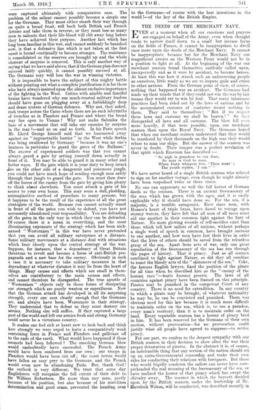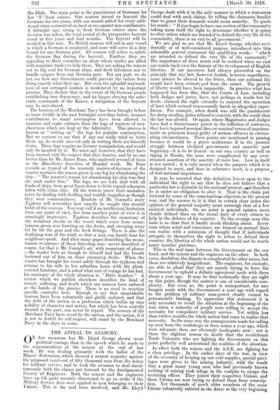THE DEEDS OF THE MERCHANT NAVY. F VEN at a moment
when all our emotions and prayers are engaged on behalf of the Army, even when thought tends to narrow itself down to a small but intense focus on the fields of France, it cannot be inappropriate to dwell once more upon the deeds of the Merchant Navy. It cannot be inappropriate because but for the Merchant Navy our magnificent armies on the Western Front would not be in a position to fight at all. At the beginning of the war our merchant seamen found themselves suddenly called upon, unexpectedly and as it were by accident, to become heroes. At least this was how it struck such an unforeseeing people as ourselves, little ready as we are to impute guile and crime to other nations. From the German point of view, of course, nothing that happened was an accident. The Germans had made up their minds that if they could not win the war by fair means they would try to win by foul. That many inhumane practices had been ruled out by the laws of nations and by the accumulated customs of centuries meant nothing to them. They said to themselves : " But if we respect these laws and customs we shall be beaten ! " So they disregarded all laws and all customs. The blow fell even more heavily, if that were possible, upon our merchant seamen than upon the Royal Navy. The Germans hoped that when our merchant seamen understood that they would be murdered by their thousands on the high seas they would refuse to man our ships. But the answer of the seamen was never in doubt. Their temper was a perfect revelation of that spirit which Emerson has described :- " So nigh is grandeur to our dust,
i So near is God to man, When Duty whispers low, Thou must '; The youth replies, ' I can ! ' "
We have never heard of a single British seaman who refused to sign on for another voyage, even though he might already have been torpedoed twice or three times.
No one can appreciate so well the full horror of German deeds as the seaman. There is an ancient freemasonry of the seas which has grown with the ages, and it is easily explicable why it should have done so. For the sea, if a majestic, is a terrible antagonist. Ever since men, with Horace's heart of triple brass, have dared to voyage upon stormy waters, they have felt that all men of all races must aid one another in their common fight against the fury of Nature. No more glowing records of self-sacrifice exist than those which tell how sailors of all nations, without perhaps a single word of speech in common, have brought succour to one another, and how men have lost their lives in order that the lives of others should be saved from the relentless grasp of the sea. Apart from acts of war, only one great repudiation of the freemasonry of the sea has run through the pages of history. That is piracy. Just as all seamen combined to fight against Nature, so did they all combine to resist the bloody acts of the " skimmers of the sea." Coke, the famous English lawyer, fixed the position of the pirate for all time when he described him as the " enemy of the human race "—hostis humani generis. The laws of all countries against piracy have been framed on this principle. Pirates may be punished in the competent Court of any country. There is no need for extradition. In any country to which a pirate may be brought, of whatever nationality he may be, he can be convicted and punished. There was obvious need for this law because it is much more difficult to maintain order on the sea, which is, to use a paradox, every man's territory, than it is to maintain order on the land. Every reputable seaman has a horror of piracy bred in him. It has been reserved for the Germans of their own motion, without provocation—for no provocation could justify what all people have agreed to suppress—to revive piracy. For our part, we confess to the deepest sympathy with our British seamen in their decision to show after the war their proper detestation of pirates. In the abstract it is, of course, an indefensible thing that any section of the nation should set up an extra-Governmental censorship and make their own rules for conducting their relations with foreigners. But those who would frigidly condemn the sailors can never have com- prehended the real meaning of the freemasonry of the sea, or have realized the horror of that piracy which has swept the chivalry away. The manner in which the boycott decided upon by the British seamen, under the leadership of Mr. Havelock Wilson, will be conducted, was described recently in the Globe. The main point is the punishment of Germany for . her ' U '-boat crimes. Our seamen intend to boycott the Germans for two years, with one month added for every addi- tional crime committed on land or sea against non-combatants. A fortnight ago, owing to fresh German crimes since the decision was taken, the total period of the prospective boycott stood at five years and four months. The boycott will be worked in this way. No British seaman will sail in any vessel in which a German is employed, and none will serve in a ship bound for any German port. All seamen will refuse to salute the German flag during the boycott. Further, they are appealing to their comrades on shore whose trades are allied with maritime trades to help them. They are asking the miners not to dig coal for German ships, and dock labourers not to handle cargoes from any German port. For our part, we do not see how any Government could prevent the sailors from doing exactly what they say. But even the splendid wayward- ness of our outraged seamen is moderated by an important proviso. They declare that in the event of the German people establishing true democracy, and no longer obeying the auto- cratic commands of the Kaiser, a mitigation of the boycott may be introduced. The heroism of the Merchant Navy has been brought before us more vividly in the past fortnight even than before, because contributors to many newspapers have been allowed to examine and make extracts from the logs of masters of mer- chantmen which are kept at the Admiralty. This process is known as " writing up " the logs for popular consumption. But we venture to say that if any one really tried to write them up, he would succeed only in writing them (or himself) down. These logs require no literary manipulation, and would only be insulted by it. We must say, however, that they have been treated with the respect that they deserve, and by no one better than by Mr. James Bone, who analysed several of them in the Manchester Guardian of Monday week. Mr. Bone records as typical of the masterly matter-of-factness of the master mariners the reason given in one log for abandoning the ship : " The master's reason for abandoning his ship was that she sank under him." The logs, we are told, deal with all kinds of ships, from great liners down to little topsail schooners laden with china clay. All the writers prove their unshaken nerve by dealing with thrilling and terrible tragedies as though they were commonplaces. Readers of Mr. Conrad's story Typhoon will remember how exactly he caught this mental habit of the seaman. You may call it an intellectual limitation from one point of view, but from another point of view it is amazingly impressive. Typhoon describes the monotony of the recurrent shocks to the vessel which come from moun- tainous green seas bursting on the decks, and sweeping away bit by bit the gear and the deck fittings. There is also the deafening roar of the wind, so that a man can barely hear his neighbour speak. And after many pages describing the mono- tonous recurrence of these battering seas—never described of course, for that is Mr. Conrad's art, with monotony of phrase —the reader feels as though he himself had had the breath battered out of him on those streaming decks. When the master has brought his vessel safely through the typhoon and returns to his wife in her suburban home with the plush- covered furniture, and is asked what sort of voyage he has had, his summary of the whole situation is, " Dirty weather." A review which we publish elsewhere describes the kind of misery, suffering, and death which our seamen have endured at the hands of the pirates. There is no need to mention specific examples here. Enough to say that unspeakable horrors have been voluntarily and gladly endured, and that the debt of the nation to a profession which builds up true nobility of character and action, but which has been scurvily i treated in the past, can never be repaid. The seamen of the Merchant Navy have stood by the nation, and the nation, if it is not to forfeit its self-respect, will stand by the Merchant Navy in the days to come.



























 Previous page
Previous page